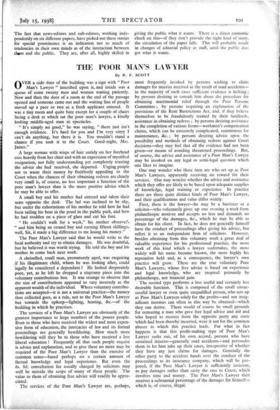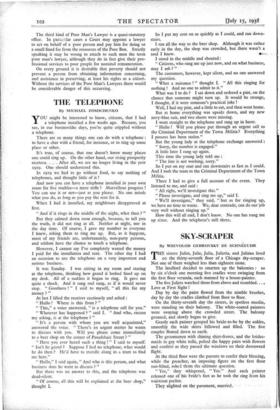THE POOR MAN'S LAWYER
By R. F. SCOTT
OVER a side door of the building was a sign with "Poor Man's Lawyer " inscribed upon it, and inside was a queue of some twenty men and women waiting patiently. Now and then the door of a room at the end of the passage opened and someone came out and the waiting line of people moved up a pace or two as a fresh applicant entered. It was a tiny room and quite bare except for a couple of chairs facing a desk at which sat the poor man's lawyer, a kindly looking middle-aged man in spectacles.
" It's simply no good," he was saying, " there just isn't enough evidence. It's hard for you and I'm very sorry I can't do anything, but there it is. You wouldn't stand a chance if you took it to the Court. Good-night, Mrs. James."
A large woman with wisps of hair untidy on her forehead rose heavily from her chair and with an expression of mystified resignation, not fully understanding yet completely trusting the advice she had received, she departed. Urging people not to waste their money by fruitlessly appealing to the Court when the chances of their obtaining redress are clearly very small is, of course, no less important a function of the poor man's lawyer than is the more positive advice which he may be able to offer.
A small boy and his mother had entered and taken their seats opposite the desk. The lad was inclined to be shy, but under the exhortations of his mother he told how he had been sailing his boat in the pond in the public park, and how he had trodden on a piece of glass and cut his foot.
" He couldn't walk for a week," his mother observed, " and him being an errand boy and earning fifteen shillings, well, Sir, it made a big difference to me losing his money."
The Poor Man's Lawyer said that he would write to the local authority and try to obtain damages. He was doubtful, but he believed it was worth trying. He told the boy and his Mother to come back next week.
A shrivelled, small man, prematurely aged, was enquiring if his illegitimate child, whom he was looking after, could legally be considered a dependant ? He looked desperately poor, yet, as he left he dropped a sixpenny piece into the voluntary contributions box. It was strange to observe that the size of contributions appeared to vary inversely as the apparent wealth of the individual. Where voluntary contribu- tions are accepted—it is not a universal practice—the money thus collected goes, as a rule, not to the Poor Man's Lawyer but towards the upkeep—lighting, heating, &c.—of the building in which he practises.
The services of a Poor Man's Lawyer are obviously of the greatest importance to large numbers of the poorer people. Even to those who have received the widest and most expen- sive form of education, the intricacies of law and its formal proceedings are generally bewildering. How much more bewildering will they be to those who' have received a less liberal education ! Frequently all that such people require is advice and explanation, and to give these no more may be required of the Poor Man's Lawyer than the exercise of common sense—based perhaps on a certain amount of factual knowledge and legal experience. But even the 6s. 8d. consultation fee usually charged by solicitors may well be outside the scope of many of these people. The value to them of obtaining free advice will readily be appre- ciated.
The services of the Poor Man's Lawyer are, perhaps, most frequently invoked by persons wishing to claim damages for injuries received as the result of road accidents— in the majority of such cases sufficient evidence is lacking ; by persons desiring to consult him about the procedure for obtaining matrimonial relief through the Poor Persons Committee ; by persons requiring an explanation of the provisions of the Rent Restrictions Act, and, if they believe themselves to be fraudulently treated by their landlords, assistance in obtaining redress ; by persons desiring assistance in the completion of various forms—workmen's compensation claims, which can be extremely complicated, summonses for maintenance, &c. ; by persons desiring advice upon the possibility and methods of obtaining redress against Court decisions—they may feel that all the evidence had not been given—or means of avoiding threatened proceedings. But, of course, the advice and assistance of a Poor Man's Lawyer may be invoked on any legal or semi-legal question which one likes to imagine.
One may wonder who these men are who set up as Poor Man's Lawyers, apparently receiving no reward for their services. One may wonder whether the advice and assistance which they offer are likely to be based upon adequate supplies of knowledge, legal training or experience. In practice there are three quite distinct kinds of Poor Man's Lawyer, and their qualifications and value differ widely.
First, there is the lawyer—he may be a barrister or a solicitor—who voluntarily gives up one evening a Week from philanthropic motives and accepts no fees and demands no percentage of the damages, &c., which he may be able to obtain for his client. In fact, he does not generally himself have the conduct of proceedings after giving his advice, but refers it to an independent firm of solicitors. However, besides -obtaining from this voluntary work a great deal of valuable experience for his professional practice, the more work of this kind which a lawyer undertakes, the more widely will his name become known, the more highly his reputation held and, as a consequence, the lawyer's own practice will grow. These are the true voluntary Poor Man's Lawyers, whose free advice is based on experience and legal knowledge, who are inspired primarily by philanthropy, not financial gain.
The second type performs a less useful and certainly less desirable function. This is composed of the small unsuc- cessful lawyer or even quite unqualified person, who sets up as Poor Man's Lawyers solely for the profits—and not insig- nificant incomes can often in this way be obtained—which they can derive. There would of course be small grounds for censuring a man who gave free legal advice and aid and who hoped to recover from the opposite party any costs which had been thereby incurred, were it not for the common abuses to which this practice leads. For what in fact happens is that this profit-making type of Poor Man's Lawyer seeks out, of his own accord, persons who have sustained injuries—generally road accidents—and persuades them to let him take up their cases, irrespective of whether they have any just claims for damages. Generally the other party to the accident hands over the conduct of the proceedings to its insurance company, which will be pre- pared, if the Poor Man's Lawyer is sufficiently insistent, to pay damages rather than carry the case to Court, which involves time and money. The Poor Man's Lawyer then receives a substantial percentage of the damages for himself— which is, of course, illegal. The third kind of Poor Man's Lawyer is a quasi-statutory office. In partr..7.1ar cases a Court may appoint a lawyer to act on behalf of a poor person and pay him for doing so a small fixed fee from the resources of the Poor Box. Strictly speaking it- may be wrong to attach to such men the term poor man's lawyer, although they do in fact give their pro- fessional services to poor people for nominal remuneration.
On every ground it is desirable that poverty should not prevent a person from obtaining information concerning, and assistance in preserving, at least his rights as a citizen. Without the services of the Poor Man's Lawyers there would be considerable danger of this occurring.











































 Previous page
Previous page